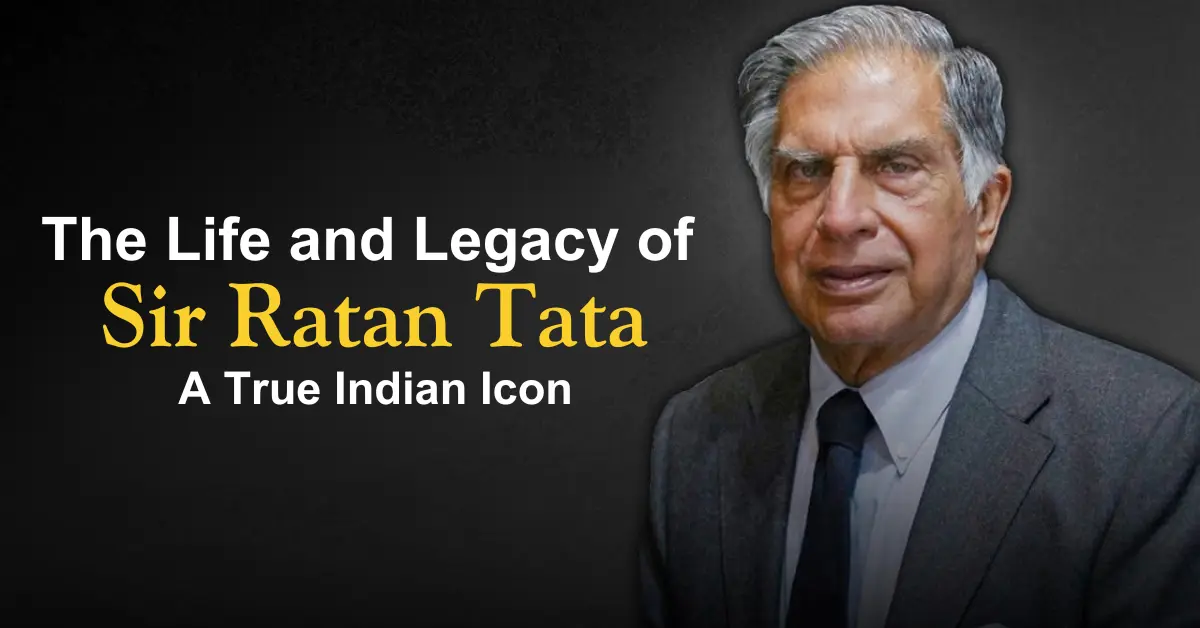
The Life and Legacy of Sir Ratan Tata: A True Indian Icon
- 182
- 0
- 0
Sir Ratan Tata, the visionary leader and chairman emeritus of Tata Group, is a symbol of humility, integrity, and innovation. Known for transforming the conglomerate into a global powerhouse, Sir Ratan Tata’s leadership was marked by his unwavering commitment to ethical business practices and corporate responsibility. Under his guidance, the group expanded globally, acquiring iconic companies like Jaguar Land Rover and Corus Steel. His philanthropic efforts, focusing on healthcare, education, and rural development, reflected his deep compassion for societal betterment. Sir Ratan Tata’s legacy inspires future generations of leaders to blend business acumen with a genuine desire to create positive social impact.
The Life and Legacy of Sir Ratan Tata
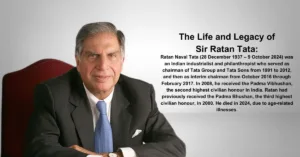
Ratan Tata is a name that stands for greatness, kindness, and business success. He has left a big mark on India and the world. Let’s look at the life of this amazing man, his many successes, and how he has changed business and society.
Early Life and Education
Ratan Naval Tata was born on December 28, 1937, in the city of Bombay, which is now known as Mumbai, India. He comes from the famous Tata family. His father, Naval Tata, was the adopted son of Ratanji Tata, and his mother was Sonoo Tata. As a child, Ratan saw many examples of good leadership and helping others from his family.
Ratan Tata went to Campion School in Mumbai and then to Cathedral and John Connon School. He went to the United States for his college education. He studied building design (architecture) and engineering at Cornell University, finishing in 1962. Later, he also did a business course at Harvard Business School in 1975.
Joining the Family Business
After finishing school, Ratan Tata came back to India in 1962 and started working for the family business, Tata Group. He began working in the Tata Steel factory, learning about the company from the bottom up. This hands-on work taught him a lot about how the business worked and helped him become a good leader later.
Becoming a Leader
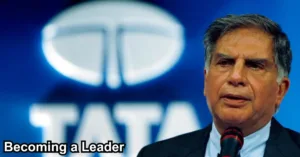
Ratan Tata’s path to the top of Tata Group wasn’t always easy. In 1971, he was put in charge of the National Radio & Electronics Company Limited (Nelco), a Tata Group company that was having problems. Under his leadership, Nelco started doing better, showing that he was good at fixing businesses.
In 1981, J.R.D. Tata stepped down as Tata Industries chairman, and Ratan Tata took over. This was a big step in his career, putting him on the path to eventually lead all of Tata Group. Finally, in 1991, when he was 54, Ratan Tata became the chairman of Tata Sons, the main company of the Tata Group.
Changing Tata Group
When Ratan Tata became chairman, Tata Group was a big but old-fashioned company. He worked hard to make it modern, grow it around the world, and start new kinds of businesses.
Some of his major accomplishments include:
- Growing Around the World: Ratan Tata helped the group buy companies in other countries, like Tetley Tea, Jaguar Land Rover, and Corus Steel. This made Tata Group famous all over the world.
- New Ideas: He pushed the group to come up with new things. One famous project was the Tata Nano, which was meant to be the world’s cheapest car.
- Computer Business: Under his leadership, Tata Consultancy Services (TCS) grew to become one of the biggest computer service companies in the world.
- Making the Brand Strong: Ratan Tata worked to make all the Tata companies use the same brand name, so people would know them easily.
- New Businesses: He started new types of businesses for Tata Group, like phone services (Tata Docomo) and stores (Tata Croma).
Helping Others

Ratan Tata is known not just for being good at business, but also for helping people. He believes that businesses should do good things for society. He made sure Tata Group used a lot of its money to help people.
Sir Ratan Tata is well-known not only for his success in business but also for his kindness and help to others. He believes in using his position to make the world a better place. Through Tata Trusts, he has supported many important causes like healthcare, education, and rural development. His donations have helped build hospitals, schools, and provide aid to people in need. Even after his retirement, he continues to support various charities and social causes. Sir Ratan Tata’s actions show that true success is not just about business, but also about making a positive impact on society.
Some of the ways he and Tata Group help others:
- Schools: Giving money to schools and helping smart students pay for their education.
- Hospitals: Giving money to hospitals and medical research, including research to find cures for cancer.
- Helping Villages: Supporting programs to make life better in Indian villages.
- Help in Disasters: Giving help when there are natural disasters in India and other countries.
Personal Life
Even though Ratan Tata has a lot of money and power, he lives a simple life and is humble. He never got married and keeps his private life quiet. He loves dogs and often talks about taking care of animals.
People respect Ratan Tata because he is honest and runs his business in a good way. He once said, “I don’t believe in taking the right decisions. “I make decisions and then work to ensure they are the right ones.” This reflects his forward-thinking approach and his commitment to standing by his choices.
Awards and Honors
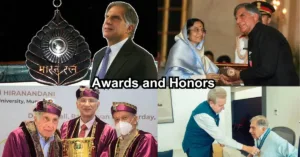
Sir Ratan Tata has received numerous awards and honors for his exceptional leadership and contributions to society. Some of his major awards include the Padma Bhushan (2000) and Padma Vibhushan (2008) from the Government of India, recognizing his outstanding work in business and social causes. He was also awarded the Honorary Knight Commander of the Order of the British Empire (KBE) by the UK government in 2009. Tata has also received several international awards, including the Asia Business Council Leadership Award and the Golden Peacock Award for Corporate Social Responsibility, acknowledging his business acumen and philanthropic efforts.
During his career, Ratan Tata has won many awards, including:
- Padma Vibhushan (2008) and Padma Bhushan (2000), two of India’s highest awards for civilians
- He was awarded the honorary title of Knight Commander of the Order of the British Empire (KBE) in 2009.
- Grand Cordon of the Order of the Rising Sun, Japan’s highest award for non-Japanese people (2012)
- Awarded an honorary fellowship by the London School of Economics and Political Science in 2007.
- Lifetime Achievement Award by the Rockefeller Foundation (2012)
Retirement and Recent Years
Ratan Tata stopped being the chairman of Tata Sons in December 2012, when he was 75. But he didn’t stop working with Tata Group completely. He still leads the group’s charity organizations and people still ask for his advice in the business world.
In 2016, when Tata Group had some leadership problems, Ratan Tata came back for a short time as chairman, showing how much he cares about the company.
His Impact on India and the World

Ratan Tata has had a big effect on business and society in India. He changed Tata Group from a company that mostly worked in India to one that is known all over the world. Today, Tata Group works in more than 100 countries and makes over $100 billion every year.
Besides making the business successful, Ratan Tata has done other important things:
- Honest Leadership: He showed how to run a business in an honest and fair way.
- New Ideas: He encouraged Indian companies to think big and try new things.
- Helping Society: He made it clear that businesses should help make society better.
- Inspiring Young People: Many young people in India who want to start businesses look up to Ratan Tata.
- Making India Proud: When he bought famous companies like Jaguar Land Rover, it made Indians feel proud and confident.
Ratan Tata, the esteemed chairman emeritus of Tata Group, passed away at the age of 86 on October 9. Renowned for his humility and philanthropic efforts, Tata led the conglomerate since 1991, guiding it through significant milestones and making crucial decisions that shaped its legacy. His leadership, integrity, and compassion will be remembered forever, leaving behind a profound impact on the business world and society as a whole.
Ratan Tata’s life story is one of vision, perseverance, and compassion. He showed that it’s possible to be a successful businessman while maintaining high ethical standards and contributing to society. His journey from a shy young man to one of India’s most respected business leaders is an inspiration to many.
Remembering a Great Leader
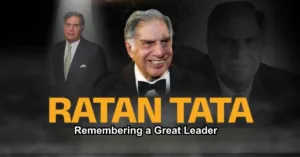
As we remember Sir Ratan Tata, we celebrate not just his business achievements, but also his kindness, integrity, and commitment to making the world a better place. His famous quote, “If you want to walk fast, walk alone. “If you wish to go far, go together” beautifully captures his philosophy in both business and life.
Ratan Tata may no longer be with us, but his ideas, values, and the businesses he built continue to shape India and the world. He leaves behind a legacy that will inspire generations to come – a legacy of excellence, ethics, and empathy. Rest in peace, Sir Ratan Tata. Your life’s work will continue to light the way for others.
Key Takeaways
- Leadership with Humility: Ratan Tata’s leadership was defined by his modesty, prioritizing integrity and ethical values over personal gain.
- Champion of Corporate Responsibility: His philanthropic work showcased the vital role of businesses in contributing to societal welfare and addressing key social issues.
- Global Vision for Growth: Under his guidance, Tata Group achieved global recognition, expanding its presence across multiple industries and countries.
- Commitment to Ethical Business Practices: Tata’s focus on transparent, honest, and ethical business practices set a high standard for corporate governance.
- A Lasting Legacy: Ratan Tata’s impact on both business and society continues to inspire leaders to make decisions that benefit people and communities, not just profits.
FAQs
1.Who is Sir Ratan Tata?
Sir Ratan Tata is the former chairman of Tata Group, a global conglomerate based in India. Known for his visionary leadership, he served as the chairman from 1991 to 2012 and played a pivotal role in transforming Tata Group into a global entity, expanding into sectors such as steel, automobiles, information technology, and more.
2.What are some key achievements of Sir Ratan Tata?
Sir Ratan Tata is credited with several groundbreaking achievements, including the global acquisitions of Jaguar Land Rover and Corus Steel. Under his leadership, Tata Motors launched the world’s most affordable car, the Tata Nano. He also helped steer Tata Group toward greater global prominence, with operations in over 100 countries.
3.What is Sir Ratan Tata known for besides business?
Besides his business success, Sir Ratan Tata is known for his philanthropic efforts. He has been deeply involved in charitable causes, particularly in healthcare, education, rural development, and community upliftment through various trusts like the Tata Trusts. His personal humility and ethical values have also earned him widespread admiration.
4.What was Sir Ratan Tata’s early life and education?
Born on December 28, 1937, Sir Ratan Tata grew up in a prominent family in India. He attended the prestigious Cathedral and John Connon School in Mumbai and later pursued a degree in architecture from Cornell University. He also completed an advanced management program at Harvard Business School. His early life was marked by a strong sense of responsibility toward the family business, which he later led with distinction.
5.What legacy has Sir Ratan Tata left behind?
Sir Ratan Tata’s legacy is one of innovation, ethical leadership, and social responsibility. His contributions to both business and society have inspired generations of leaders. He set an example by integrating business success with philanthropy, ensuring Tata Group’s growth while also addressing key social issues. His vision continues to impact global industries and India’s corporate landscape.
Also Read:
The Legendary Legacy of Comic Genius Brahmanandam 2024
References:
https://www.tata.com/about-us/tata-group-our-heritage/tata-titans/ratan-naval-tata
https://en.wikipedia.org/wiki/Ratan_Tata
Disclaimer: The information provided in this blog about Sir Ratan Tata’s life and legacy is for informational purposes only. While we strive for accuracy, individual interpretations may vary. For comprehensive insights, please consult authoritative sources and biographies.
Related post

7 Health Benefits of Assam Tea


